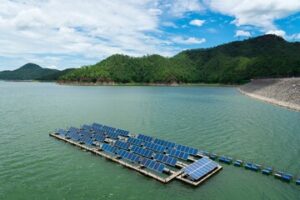By Cameron Mitchell
Solution 105 Consulting Ltd.
“DON’T BE AN APRIL FOOL… FLOAT”
 Though electricity and natural gas market rates continue to tumble lower, most retailers have not yet moved their fixed rate options to similar levels. So, unless you have a great rate already locked in at your home, our advice would be to move to a floating rate. We will continue to watch retailers’ offers and expect they will start to drop fixed rates over the next few months.
Though electricity and natural gas market rates continue to tumble lower, most retailers have not yet moved their fixed rate options to similar levels. So, unless you have a great rate already locked in at your home, our advice would be to move to a floating rate. We will continue to watch retailers’ offers and expect they will start to drop fixed rates over the next few months.
March spot electricity rates came in around 7 cents per kWh for the month. April and May forward rates suggest those months will be coming in at around 8 cents per kWh and 6 cents per kWh, respectively. EPCOR’s RRO for April totals 14.692 cents per kWh.
The spot market for natural gas averaged roughly $1.70/GJ for March. The forward market for natural gas has remained similar to last month. Short term rates are trading under $2.00/GJ. This being the case, we suggest moving to a floating rate if your current fixed rate is above $3.30/GJ. Forward market gas rates for all of calendar 2024 are trading near $2.00/GJ, 2025 is trading around $3.15/GJ, and 2026 to 2028 are in the $3.60/GJ range.
WE RECOMMEND:
Natural Gas Only: Unless you have a longer-term fixed rate under $3.00/GJ, we recommend getting onto a floating rate.
- Direct Energy REGULATED Services. DERS. This is the default, no retailer rate. It is a floating rate. Check with your current provider to ensure there are no cancellation fees, etc. This rate is very close to spot plus $0.122 per GJ. The monthly admin fee is about $10.17/month.
- Acorn Energy has a floating rate of spot plus $0.40 per GJ. The monthly admin fee is $7.35/month. Free termination. Deposit and PAD (Pre-Authorized Debit) required.
Electricity Only: Unless you have a fixed rate contract below 7.5 cents per kWh, it may be time to consider a floating rate:
Best floating rate options:
- Best option is Acorn Energy as their floating rate is spot plus 0.50 cents/kWh. Monthly admin fee: $7.35/month. Free termination. Deposit and PAD (Pre-Authorized Debit) are required.
- Encor by EPCOR has a floating rate of spot plus 1.00 cents/kWh. The monthly admin fee is about $8.20/month.
The best fixed rate options:
- Direct Energy has an introductory offer of 7.77 cents per kWh until July 31, 2024, that then goes to 10.59 cents per kWh on a five-year plan. Admin of $12.50 per month… ouch! Free termination.
- Empowering Communities Energy has a 10.55 cents per kWh option on a three-year plan. Admin of $6.60 per month. Free termination. Deposit and PAD (Pre-Authorized Debit) are required.
Solar Club: If you have solar panels, you should start to consider the high-rate options available.
- Many different UtilityNet providers have fixed 30.00 cents per kWh rates available. If your home is exporting more electricity than it is using, you could swap to this rate. Acorn Energy is one of many options. Start watching for when your system is importing more than it is exporting. You will want to move to a high-rate option soon.
AT MY HOUSE
On March 1, 2023 I moved my gas supply off the three-year renewal offer from ATCO for 5.99 cents per kWh and $3.99/GJ (and an admin fee of $6.99 per meter per month). I was told that moving my gas would not impact my fixed electricity rate or come with any gas cancellation fees, but I have heard stories from others who did not get the same feedback – so, best to double check and get something in writing.
I am now floating on DERS for gas and still with ATCO at 5.99 cents per kWh for electricity (until November 30, 2024). If I didn’t have this plan in place, I would go with a DERS or Acorn Energy floating rate for gas and the Acorn Energy floating plan for electricity as soon as possible. If something better comes along in the future, these plans can be terminated at no cost.
NATURAL GAS
 The retailer offers we have seen are no better than $3.43/GJ. Short term forward market pricing is now slightly below $2.00/GJ, with 2024 expected to average around $2.00/GJ, and pricing below $3.50/GJ until winter 2025. So for gas, we recommend a floating rate. In general, a good option is to go with Direct Energy REGULATED Services (DERS)… remember “Regulated Service”. If you are not with DERS now, you will automatically go there if you terminate your current gas contract. Make sure there are no termination fees! There may also be a small enrollment fee to get on with DERS.
The retailer offers we have seen are no better than $3.43/GJ. Short term forward market pricing is now slightly below $2.00/GJ, with 2024 expected to average around $2.00/GJ, and pricing below $3.50/GJ until winter 2025. So for gas, we recommend a floating rate. In general, a good option is to go with Direct Energy REGULATED Services (DERS)… remember “Regulated Service”. If you are not with DERS now, you will automatically go there if you terminate your current gas contract. Make sure there are no termination fees! There may also be a small enrollment fee to get on with DERS.
DERS has an admin fee of about $10.17 per month and their floating rate includes a margin of roughly 12.2 cents per GJ. Still, this is better than most floating margins which average over $0.40 per GJ.
For April, the Direct Energy Regulated Services (“DERS”) rate is $1.933/GJ. Approximately $0.10/GJ of this figure is to recoup previous period undercharges. We expect April’s DERS rate will be approximately $1.80/GJ.
ELECTRICITY
 As the forward market is suggesting electricity rates will be lower than the current fixed rate retail offers available, we would recommend moving to a floating rate offer this month – unless you have a fixed rate contract below 7.5 cents per kWh.
As the forward market is suggesting electricity rates will be lower than the current fixed rate retail offers available, we would recommend moving to a floating rate offer this month – unless you have a fixed rate contract below 7.5 cents per kWh.
Forward pricing currently suggests index residential rates will come in around 8 cents per kWh in April and around 6 cents per kWh in May. The remainder of 2024 is trading at roughly 7 cents per kWh. March averaged about 7 cents/kWh on the floating index.
As the forward market is suggesting rates below 8 cents per kWh going forward, we will continue to watch the market to see if a fixed option might become more appropriate. Summer often can experience tightening the supply/demand balance, but so far it is looking like lower rates may prevail.
If I were to pick an electricity only option today, I’d go with the Acorn Energy floating plan.
Just to help put things into perspective, all that we are talking about here is the commodity rates and costs, not the delivery and other regulated charges. An average house might use around 9,000 kWh and 100 GJ over a year.
COMMERCIAL USERS
 And for those of you who are not residential users, give us a call. We are now seeing much better pricing for commercial users compared to residential users, and we can help get the lowest rates for your business.
And for those of you who are not residential users, give us a call. We are now seeing much better pricing for commercial users compared to residential users, and we can help get the lowest rates for your business.